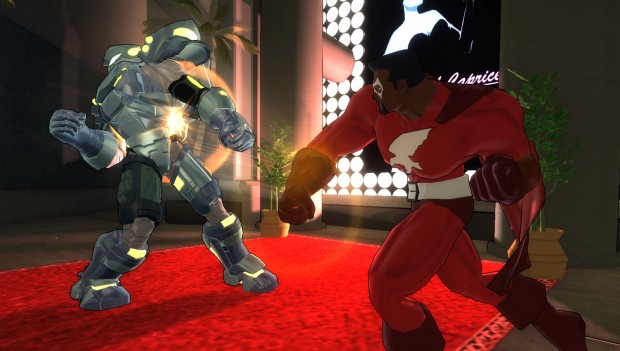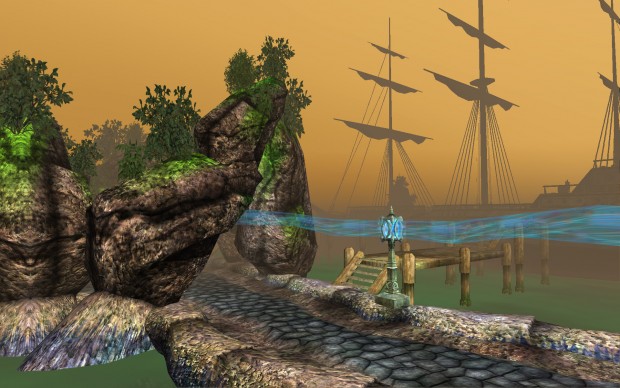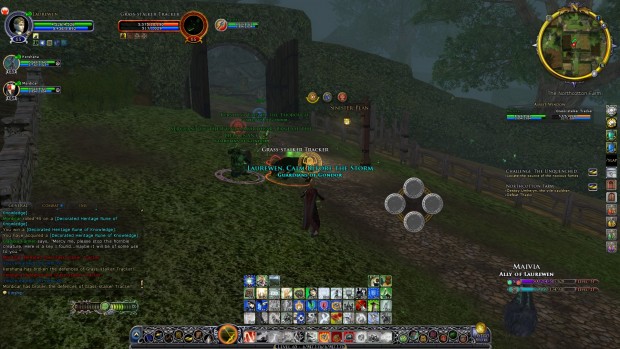Do MMOs Have A Five-Year Expiration Date?
Star Trek Online recently celebrated its five-year anniversary. Then Perfect World Entertainment announced layoffs earlier this week, impacting members of the STO dev team, as well as those of Champions Online, which launched a few months before STO and a surviving staff member classified as “being left to chug along.”
This got me to wondering about the practical lifespan of online games. Is five years as long as a game can be expected to go if it's not a major success? Should they even keep going past that point, or is it better to “put a game out to pasture” in a dignified manner than to let it limp along?
Even though I'll use specific examples, I'm not suggesting any particular game be shut down because “lol that game's dead.” And the “five-year” rule certainly doesn't apply to everything; PvP games tend to have a longer shelf life than most, due in part to the relatively little development needed to keep them afloat. For the most part, this will be about primarily PvE MMORPGs, which have their exceptions (World of Warcraft most notably) but which do seem to be greatly lessened after a certain point.
As we always knew (and was recently quantified), free-to-play MMOs, and probably all MMOs in general, tend to decline sharply after their launch. When I was working on collectible card games, I was told that you only needed 18 months to determine if a game was going to be a long-term success. Given the longer development cycle and expense of an MMO, it makes sense to give it a little longer, but by the time five years have elapsed, pretty much everyone who's going to try a game has done so and either chosen to play it or not to. There's virtually no acquisition potential left, and existing players are fairly steady but will inevitably trickle away as new things grab their attention.
Eventually, reality has to settle in. The people managing a five-year-old MMO have to know that what they've got is all they're ever going to get. On the balance sheet, they might be OK with their minimal return versus their relatively minimal ongoing costs, but is that enough to satisfy the players?
Players of an online game, especially a PvE MMORPG, always want more, more, more. If they don't get it, they're going to try something else, and these days, there are a whole lot of “something elses” out there, and they're usually free to at least try, making it easy to lure folks away from their existing hobbies.
When a game is aging, and there's no sign of a cash infusion, content delivery slows down. When content delivery slows down, some players tend to look elsewhere. When some players look elsewhere, that leaves fewer players for the diehards, who then leave, and so on and so forth. It's a downard spiral that might be stabilized but never reversed. And, if things get particularly dire, we have things like what happened with Perfect World Entertainment or the EverQuest team at Daybreak.
What's the proper solution? Is it to keep “chugging along” like Champions Online or is it to (pardon the puns) freeze game development or just “let it go”? Just like the CCG players I encountered decades ago, MMO players have an expectation that their game will go on forever, with updates proceeding now until the end of time. After all, it's EverQuest, not LimitedTimeQuest. Every game is different, but the reality of the situation dictates that everything can't be as it was when a game was new and fresh, with money rolling in and content updates proceeding apace, as it is five years or so down the line.
As we've seen with City of Heroes and Star Wars: Galaxies, shutting down once-popular, but aging and lightly populated, games can lead to a massive PR hit. Maybe the better solution is to keep a game going in “maintenance mode,” keeping it alive but with no new development, as ArenaNet has done with the first Guild Wars. Granted, having a new game, Guild Wars 2 in this case, made that decision a little easier to stomach for fans of the original. With EverQuest Next in the works, Daybreak may be able to pull that off with EverQuest or EverQuest II, but would it be a possibility for a game like Champions Online or other Perfect World or Daybreak games?
As you might know, I've played The Lord of the Rings Online since beta – eight years ago in April – and while I'm not into it as much as I used to be, this topic hits home for me. I suppose I'd be sad to see it go, and there are still people rabidly devoted to the game who would feel the pain of its shuttering even worse.
But I also remember how much fun the game used to be in its first couple of years, and I don't think that's just a case of rose-colored glasses. I don't need a talkative ex-Turbine employee to tell me that the game doesn't bring in as much money and get as much development as it used to; it's obvious just by playing. For me, LOTRO is still nice as an occasional diversion, but it's a shadow of what it used to be. Sometimes I feel like I'd be OK with it going away entirely, because it's never going to go back to what it once was. I've (mostly) moved on, and have loads of other entertainment options to occupy my time.
Still, it's nice to run around in Middle-earth from time to time, and I wouldn't mind seeing LOTRO dropped into some kind of maintenance mode like Guild Wars, so I could visit the Shire, Rivendell, Moria, and Gondor effectively forever. Granted, the Lord of the Rings license costs money, so it's unlikely that I'll have that luxury after 2017. When the end does come, I'll be saddened by it, but it'll be like hearing that a business you frequented in your youth has shut down. It's unfortunate, especially for the people employed there, but from your perspective, your love is in the past and was unlikely to ever be rekindled again.
Maybe a clean break – a sense of closure, if you will – is the best solution for all parties involved. It frees up the resources of the developer to produce something else while also keeping the players from clinging to something they once loved that is now greatly diminished.
About the Author

Jason Winter is a veteran gaming journalist, he brings a wide range of experience to MMOBomb, including two years with Beckett Media where he served as the editor of the leading gaming magazine Massive Online Gamer. He has also written professionally for several gaming websites.
More Stories by Jason WinterRead Next

Feature
Love It Or Hate It: Dota 2
Some free-to-play games are more polarizing than others, with some sides taking the stance of "great, totally non-exploitative implementation" and others thinking "total pay-to-win trash." We'd like to see on what side of the ...
You May Enjoy

Learn how to master the kit of Rogue, the latest Marvel Rivals Vanguard to join the roster in Season 5.5

The trip to Lahai-Roi is worth it.

Explore the new Huaxu region and fight the Scourge of Zhuyin.

And I mostly feel fine about my gaming choices.



The one thing that I see very little of in MMOs nowadays is dedication. I mean, how do people think WoW has always been so successful? Blizzard was not a huge company when they were developing WoW and they only had a few successes, but they had amazing passion and dedication to their games. They never rushed things, and they never released half-assed crap. WoW was a massively ambitious project, unlike anything that existed at the time, and it payed off. So what did they do with that pay-off? They dedicated it to bringing more to the game. That is the reason nobody has been able to reach that level of success.
Developers of MMOs don't get into MMOs because they have ambitious, new ideas that they want to share with the world. They do it because it has the potential to make a lot of money over a long period of time. They're trying to emulate the success of others, with very little passion and dedication to the game they're developing. It is simply a means to an end; an end that they will never reach, because they are missing the whole point of game development in the first place. Video games are supposed to be about art and beauty, and full of passion and desire to bring joy to others, but I guess those times are long gone, at least in the realm of MMOs.